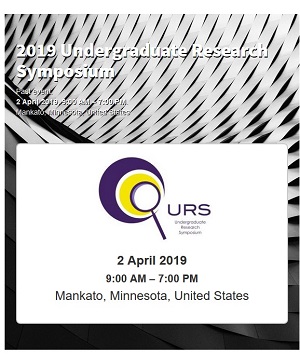Emotional Challenges/Symptoms and Learning Experiences of College Students with a Traumatic Brain Injury
Location
CSU Ballroom
Start Date
2-4-2019 2:00 PM
End Date
2-4-2019 3:30 PM
Student's Major
Speech, Hearing, and Rehabilitation Services
Student's College
Allied Health and Nursing
Mentor's Name
Hsinhuei Sheen Chiou
Mentor's Department
Speech, Hearing, and Rehabilitation Services
Mentor's College
Allied Health and Nursing
Description
The purpose of this research is to bring attention to the emotional challenges and learning experiences that college students' face with a traumatic brain injury (TBI) in an educational setting. Our research questions include: Do college students with TBI experience emotional challenges? What are their biggest challenges their faced with? Based on our literature review, college students have acquired a TBI experience varies emotional symptoms at different levels of severity that can impact their academic abilities significantly.
Eleven college students with an acquired traumatic brain injury were recruited. A survey was administered to gather perspectives from college students with a TBI. The survey consisted of multiple choice, and yes/no question formats were used to collect results. A 5-point rating scale was used to determine the severity of symptoms each student experienced. The survey gathered information about emotional challenges and the academic experience of each participant. The questions were formed to gather information about their college experiences prior to and after their TBI. All survey responses were collected on the secured Qualtrics website and used for data analysis. Data as analyzed by the research team using descriptive, quantitative and qualitative statistics.
Results showed that after acquiring a TBI, college students most commonly reported; feelings of frustration, depression, anxiety, mood swings, and reduced motivation. These emotional symptoms were likely to associate with a reduced quality of academic performance.
Emotional Challenges/Symptoms and Learning Experiences of College Students with a Traumatic Brain Injury
CSU Ballroom
The purpose of this research is to bring attention to the emotional challenges and learning experiences that college students' face with a traumatic brain injury (TBI) in an educational setting. Our research questions include: Do college students with TBI experience emotional challenges? What are their biggest challenges their faced with? Based on our literature review, college students have acquired a TBI experience varies emotional symptoms at different levels of severity that can impact their academic abilities significantly.
Eleven college students with an acquired traumatic brain injury were recruited. A survey was administered to gather perspectives from college students with a TBI. The survey consisted of multiple choice, and yes/no question formats were used to collect results. A 5-point rating scale was used to determine the severity of symptoms each student experienced. The survey gathered information about emotional challenges and the academic experience of each participant. The questions were formed to gather information about their college experiences prior to and after their TBI. All survey responses were collected on the secured Qualtrics website and used for data analysis. Data as analyzed by the research team using descriptive, quantitative and qualitative statistics.
Results showed that after acquiring a TBI, college students most commonly reported; feelings of frustration, depression, anxiety, mood swings, and reduced motivation. These emotional symptoms were likely to associate with a reduced quality of academic performance.
Recommended Citation
Kothe, Lindsay; Stephanie Grams; and Jessica Neaton. "Emotional Challenges/Symptoms and Learning Experiences of College Students with a Traumatic Brain Injury." Undergraduate Research Symposium, Mankato, MN, April 2, 2019.
https://cornerstone.lib.mnsu.edu/urs/2019/poster-session-B/29




